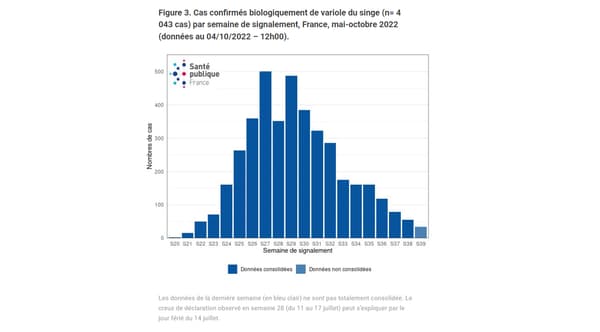As we enter autumn, several epidemics are still circulating in the national territory. In France, Covid-19 figures have been on the rise since September, and the number of cases of people infected with dengue fever is skyrocketing.
Meanwhile, the monkeypox epidemic is at this stage under control throughout the country. Finally, the flu epidemic is expected during the month of October and worries the health authorities. Where are these four epidemics in the national territory? BFMTV.com takes stock of its development.
Dengue fever: the largest outbreak ever recorded in mainland France
In metropolitan France, there has been a marked increase in dengue cases contracted since July, the beginning of the peak of contamination by this disease, whose main contamination is registered between May and November. Thus, 61 cases have been identified since May from 5 separate sources of contamination, according to the latest figures from Public Health France on October 4.
The Alpes-Maritimes has the largest dengue outbreak ever recorded in mainland France: 33 people were infected in the territory of three neighboring municipalities, which represents more than half of all cases recorded in mainland France.
Since May, the other dengue cases listed are in the Var (7 cases), in the Haute Garonne (6 cases), in the Hautes-Pyrénées (4 cases), the Pyrénées-Orientales (1 case) but also in the Tarn-et-Garonne (1 case).
Health authorities are conducting enhanced monitoring for dengue fever, as well as chikungunya and Zika cases, from May 1 to November 30.
Covid-19: increase in cases since September
Metropolitan France is currently experiencing an eighth wave of Covid-19. The figures for the disease are on the rise on all fronts, according to Santé Publique France: number of cases, hospitalizations, people in intensive care, but also deaths. The situation is reversed outside of France, where these indicators are falling.
According to the latest figures published by the institution, the circulation of SARS-CoV-2 continued to advance this Friday throughout the metropolitan territory with 471 cases per 100,000 inhabitants from September 26 to October 2. An increase in the incidence rate of 31% compared to the previous week, which affects all age groups, except those under 20 years of age, and is again more pronounced in the older ones, especially those of 80 and more years.
New hospitalizations continued to rise with 4,370 new hospitalizations recorded (+25% in one week) and 379 new critical care admissions (+21%), as well as the number of deaths (217, ie +10%) .
At the same time, the number of vaccine booster doses has been slowly falling since early September, falling below 2,000 injections per day on October 4, according to Ministry of Health and Covid Tracker data.
Monkeypox: a markedly lower incidence rate
As of October 4, 4,043 confirmed cases of monkeypox virus infection had been identified in France, that is, an additional 44 cases since the evaluation of September 27, indicates Public Health France.
However, the number of cases has been steadily declining since the end of July, in the context of the launch of the vaccination campaign. The vaccine against the disease has been recommended since July 8 by the health authorities. Since then, nearly 120,000 doses have been administered, according to figures from the Ministry of Health.
At this point, just over 2% of those infected have been hospitalized. No deaths have ever been recorded in France. Île-de-France concentrates 61% of the cases (2,467 cases), followed by Occitanie (312 cases), Provence-Alpes-Côte d’Azur (273 cases) and Auvergne-Rhône-Alpes (267 cases).

Influenza: Towards a Potential Major Epidemic This Winter
The flu virus is not yet “under surveillance” by Public Health France, due to low or non-existent activity: no data is yet available at this stage. However, in early October, the Minister of Health, François Braun, called for surveillance and vaccination.
“We do not need another pandemic (…) The important thing is not to be worried but to be vigilant. We know that our health system is under pressure and we do not need another pandemic,” the minister shared in an interview with the regional press.
Some experts speak of an early seasonal flu epidemic this year, the impact of which could be much greater than in 2020 and 2021.
“This year it will be difficult to maintain the same level of protection: masks, distancing, intensive hand washing… Given this relaxation, there is a serious risk of a flu epidemic,” analyzed immunologist Alain Filer.
Add to that an immune weakness for people who haven’t had the flu for two years, as immunologist Jennifer Nayak recently explained.
For the flu, however, the vaccination campaign will not start until October 18 in mainland France, Guadeloupe, Martinique and Guyana. The vaccine is recommended for people over 65 years of age, pregnant women, people with pathologies that may lead to complications, and exposed health professionals.
Public Health France specifies that in “metropolitan France, the epidemic occurs every year, generally between the months of November and April, with a more frequent onset in late December – early January. It has an average duration of 10 to 11 weeks” .
Source: BFM TV

